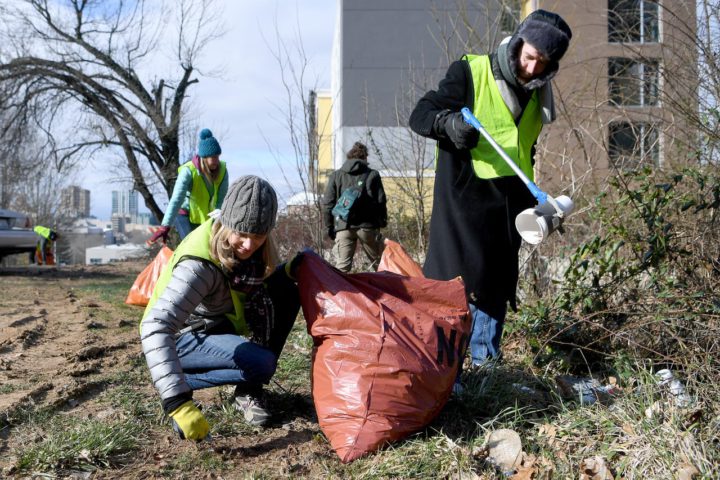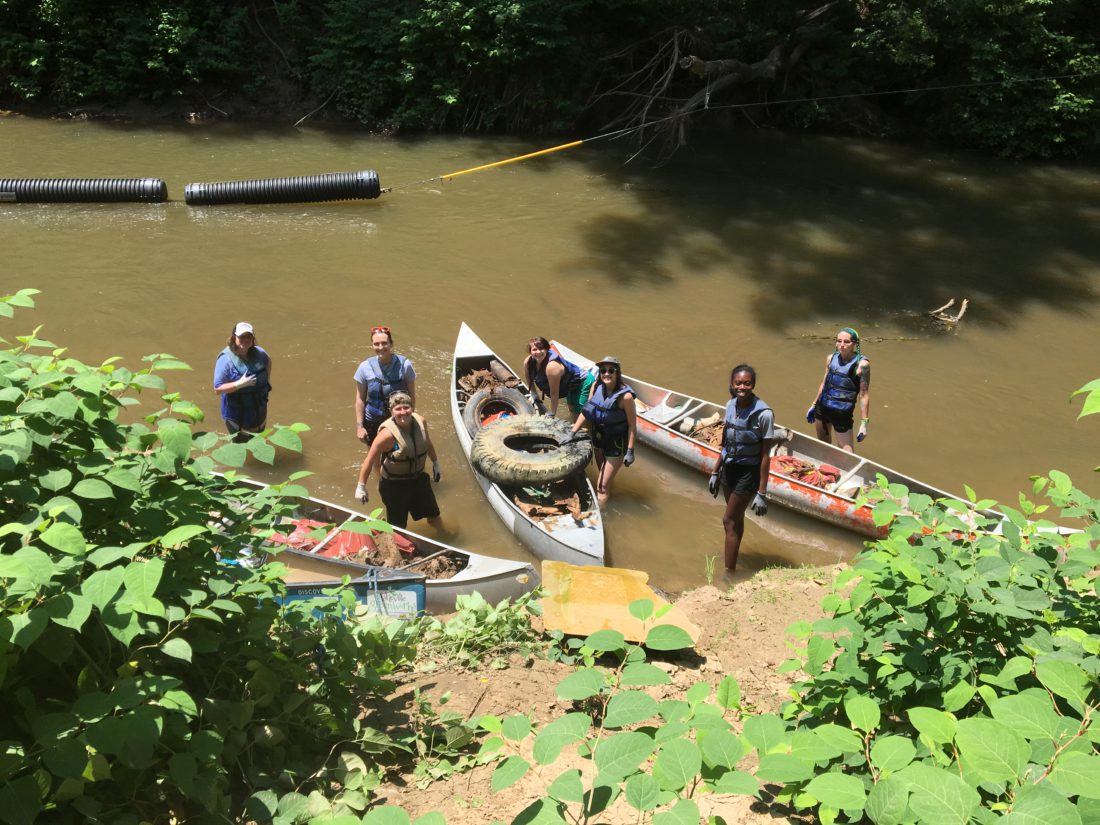A lot has changed in Buncombe County over the past 50 years: Development is dense, highways eke through the mountains and the landscape is dotted with cellphone towers. But for Asheville GreenWorks, the nonprofit that organizes trash cleanups around rivers, greenways and roads, one thing hasn’t changed.
Humans are messy.
“We’ve pretty much been doing cleanups for 50 years without really seeing any real changes,” operations manager Chelsea Adams tells Xpress. “We go back to the same roads, in the same section of river and creek, every single year and do cleanups over and over and over.”
Keeping water litter-free
GreenWorks puts its resources “where they’re going to be most impactful for the French Broad and the Swannanoa, and all of our different tributaries,” explains Adams. Its goal with both roadside cleanups and litter prevention is “the health of the waterways.” Adams cites the River Arts District as a priority, as well as Riverside Drive, Amboy Road, Meadow Road and Emma Road. In East Asheville, the priorities are Swannanoa River Road, Sweeten Creek Road and the Haw Creek area.
Previously, AmeriCorps, a federal service program, provided GreenWorks with a watershed outreach coordinator. Now that role will be in-house.
GreenWorks also makes and installs “Trash Trouts,” which are placed on rivers and tributaries to capture litter. It installed the first one in Mud Creek in Hendersonville and has since installed 35 Trash Trouts in five states.
Who litters? It could be us
On the city side, Asheville hasn’t researched the source of the trash it works to pick up. “I’m not going to blame tourists; I’m not going to blame unhoused people,” says Jes Foster, manager of the city’s Sanitation Division. “There are so many different places litter comes from. People not bagging their residential trash leads to litter. People overflowing their trash carts leads to litter. Bears and wildlife getting into carts leads to litter.”
She adds, “I think people tend to want to point their finger at others … a lot of us contribute to litter, consciously or unconsciously.”
Foster believes litter “became more visible during COVID because we didn’t have as many volunteer groups picking it up.” Adams concurs that GreenWorks was unable to organize as many cleanups during the first two years of the COVID-19 pandemic.
There generally are two categories of litterbugs, says Kim Spillars, Buncombe County environmental control specialist. When some people can’t find a nearby trash can, they dump items out of their cars or leave litter in the park. “That’s all over the county — there’s no specific area that I would say is worse than the other,” she says.
Adams says not enough trash receptacles are placed in areas that people frequent. “I’ve heard in certain neighborhoods and along greenways, you can walk blocks and blocks and blocks before you find a public trash can that you can put your litter into,” she tells Xpress.
Another issue is litter that blows off the back of commercial and personal vehicles that haven’t properly secured their loads. Foster calls vehicular litter a “huge [issue],” and recalled a recent drive to work when a Styrofoam container blew off someone’s truck and stuck to her windshield.
A second category of litterbugs are those who dump large amounts of trash illegally. They can include businesses, like builders not properly disposing of construction waste, or residences tossing household waste or items like old tires or couches where they don’t belong.
Hookers Gap Road, Candler Knob Road in Candler, Spivey Mountain Road in Leicester and Buckeye Cove Road, Bee Tree and Swannanoa are hot spots for illegal dumping, particularly in forested areas, says Spillars.
How much litter?
Asheville fields calls about litter from a variety of sources, making tracking the amount of litter difficult, Foster says. People report litter to the city in numerous ways through different departments, including her department, Parks & Recreation and Water Resources. Drivers for the city’s Sanitation Department, who collect residential curbside trash, report litter as well.
Fortunately, the city has the resources — for now — to pick up more trash. The federal American Rescue Plan Act funds enabled a pilot program last month. That program is addressing trash in highly visible areas, including city parks. And according to a city press release, it’s “the first program dedicated solely to litter collection outside of the Central Business District.”

The $500,000 is a one-shot infusion, says city spokesperson Kim Miller.
WNC Landscaping has been contracted for that program, as well as its work to tidy up downtown. Teams started cleanup March 27 in West Asheville and have collected litter from 60 shoulder miles of city-maintained roadway that totaled 1,380 pounds, Foster tells Xpress in an email.
The new program’s cleanup schedule will rotate through the southern, eastern and northern quadrants of the city for one week in each quadrant and then rotate through the quadrants “on a continuous cycle.”
Community members have always called or emailed with complaints about litter, but there wasn’t a formal reporting mechanism until now. “In the past when people would submit a general complaint about roadside litter, we would take it but didn’t really have a crew to go collect it,” Foster explains. “Now that we do, we’re advertising more heavily to please report it.”
The Asheville App began accepting reports about litter complaints on city-owned streets and city-owned properties Jan. 1 and has received 109 reports so far. Some of those requests are duplicates, while others were about illegal dumping rather than roadsides, Foster says. (Litter can also be reported at sanitation@ashevillenc.gov or calling the city’s customer service line at 828-251-1122.)
GreenWorks organizes cleanups in specific neighborhoods based on community requests, but it doesn’t work in areas the city’s maintenance already covers. “We tend to not put volunteer efforts toward the areas that the city is paying somebody to do,” Adams explained.
Interstate cleanups
In addition to local municipalities, the state has a hand in local cleanup too. Contractors with the N.C. Department of Transportation clean up interstates 240 and 40 from mile marker 44 to mile marker 46 twice per month, says spokesperson David Uchiyama. All other interstates and other heavily traveled routes are picked up once a month.
The remaining routes without medians are picked up every other month, Uchiyama says. County-specific maintenance teams also pick up litter on some routes. He says NCDOT’s work is supported by 73 organizations in Buncombe County that participate in its Adopt-A-Highway program, which is volunteer run. Six organizations participate in Sponsor-A-Highway, which funds the contracted services.
It’s all hands on deck for spring and fall efforts, which enlist the help of county and state maintenance teams and volunteers. (Find more information about NCDOT cleanups and how to volunteer here: avl.mx/clq.)
NCDOT collected 852,630 pounds of litter from Buncombe and the six other counties that comprise its departmental division in 2021. In the eight-county district that includes Henderson County, NCDOT collected 528,780 pounds that same year.
Among the priorities of NCDOT, Uchiyama noted the department fills many roles. “Our maintenance teams and contractors strive to keep roadsides as clean as possible while balancing safety, infrastructure conditions and litter control operations,” he says. “The money spent on litter could easily go to other maintenance operations such as paving, mowing or drainage improvements.”
More people, more litter?
Buncombe County Solid Waste Department Director Dane Pedersen says he’s uncertain that the county’s rising population has affected the amount of litter, suggesting litter may simply be more visible.
Buncombe County’s population rose nearly 15%, going from 238,318 in 2010 to 273,589 in 2022, according to the U.S. Census Bureau. The six incorporated municipalities within Buncombe County each have their own program for residential and commercial waste collection. For unincorporated areas (meaning a community outside of city limits, without a local government), Buncombe County has a contract with Waste Pro.
The seasonal population of Buncombe County, which is attributable to both homeowners and tourism, does have a slight impact on the county’s trash pickup services. Waste Pro spokesperson Tracy Meehan, says the company has 36,000 current accounts open across Buncombe County, and the amount of accounts rises by 2,000 during the fall, spring and summer.
Whether these additional accounts will result in additional litter is unknown. Regardless, cleanup crews can rest easy that their jobs are secure.



I find it interesting that while there are so many ongoing rants on social media regarding the excessive amounts of trash produced and left behind by our local community of homeless folks and this article doesn’t even seem to recognize this “source” of litter.